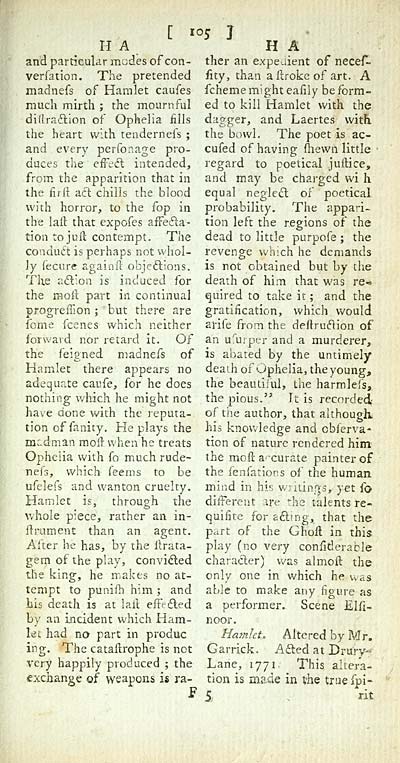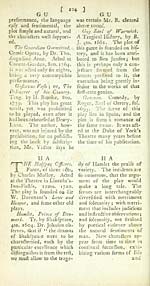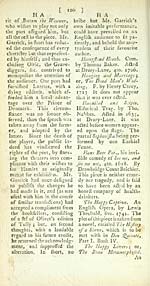Glen Collection of printed music > Printed text > New theatrical dictionary
(119) Page 105
Download files
Complete book:
Individual page:
Thumbnail gallery: Grid view | List view

[ »°5
H A
and particular modes of con-
verfation. The pretended
]
madnefs of Hamlet caufes
much mirth ; the mournful
distraction of Ophelia fills
the heart with tendernefs ;
and every perfonage pro-
duces the effect intended,
from the apparition that in
the iiril act chills the blood
with horror, to the fop in
the laft that expofes affecta-
tion to juil contempt. The
conduct is perhaps not whol-
ly fecure againit objections.
The action is induced for
the moil part in continual
progreffion ; but there are
Some fcenes which neither
forvvard nor retard it. Of
the feigned madnefs of
Hamlet there appears no
adequate caufe, for he does
nothing which he might not
have done with the reputa-
tion of fanity. He plays the
madman moll when he treats
Ophelia with fo much rude-
nefs, which feems to be
ufelefs and wanton cruelty.
Hamlet is, through the
whole piece, rather an in-
flrument than an agent.
After he has, by the llrata-
gem of the play, convicted
the king, he makes no at-
tempt to punifh him ; and
his death is at lail effected
by an incident which Ham-
let had no part in produc
ing. The catastrophe is not
very happily produced ; the
exchange of weapons is ra-
il A
ther an expedient of necef-
iity, than a Stroke of art. A
Scheme might eafily be form-
ed to kill Hamlet with the
dagger, and Laertes with,
the bowl. The poet is ac-
cufed of having mewn little
regard to poetical juftice,
and may be charged wi h
equal neglect of poetical
probability. The appari-
tion left the regions of the
dead to little purpofe ; the
revenge which he demands
is not obtained but by the
death of him that was re«
quired to take it ; and the
gratification, which would
arife from the deflruclion of
an ufurper and a murderer,
is abated by the untimely
death of Ophelia, the young,
the beautiful, the harmlefs,
the pious." It is recorded;
of the author, that although*
his knowledge and observa-
tion of nature rendered him
the moll accurate painter of
the fenfations of the human
mind in his writings, yet fo
different are "he talents re-
quisite for acting, that the
part of the Ghofl in this
play (no very confiderable
character) was almoft the
only one in which he was
able to make any figure as
a performer. Scene Elfi-
noor.
Hamlet. Altered by Mr.
Garrick. Acted at Drury-
Lane, 1771 . This altera-
tion is made in the true fpi^
S s Vit
H A
and particular modes of con-
verfation. The pretended
]
madnefs of Hamlet caufes
much mirth ; the mournful
distraction of Ophelia fills
the heart with tendernefs ;
and every perfonage pro-
duces the effect intended,
from the apparition that in
the iiril act chills the blood
with horror, to the fop in
the laft that expofes affecta-
tion to juil contempt. The
conduct is perhaps not whol-
ly fecure againit objections.
The action is induced for
the moil part in continual
progreffion ; but there are
Some fcenes which neither
forvvard nor retard it. Of
the feigned madnefs of
Hamlet there appears no
adequate caufe, for he does
nothing which he might not
have done with the reputa-
tion of fanity. He plays the
madman moll when he treats
Ophelia with fo much rude-
nefs, which feems to be
ufelefs and wanton cruelty.
Hamlet is, through the
whole piece, rather an in-
flrument than an agent.
After he has, by the llrata-
gem of the play, convicted
the king, he makes no at-
tempt to punifh him ; and
his death is at lail effected
by an incident which Ham-
let had no part in produc
ing. The catastrophe is not
very happily produced ; the
exchange of weapons is ra-
il A
ther an expedient of necef-
iity, than a Stroke of art. A
Scheme might eafily be form-
ed to kill Hamlet with the
dagger, and Laertes with,
the bowl. The poet is ac-
cufed of having mewn little
regard to poetical juftice,
and may be charged wi h
equal neglect of poetical
probability. The appari-
tion left the regions of the
dead to little purpofe ; the
revenge which he demands
is not obtained but by the
death of him that was re«
quired to take it ; and the
gratification, which would
arife from the deflruclion of
an ufurper and a murderer,
is abated by the untimely
death of Ophelia, the young,
the beautiful, the harmlefs,
the pious." It is recorded;
of the author, that although*
his knowledge and observa-
tion of nature rendered him
the moll accurate painter of
the fenfations of the human
mind in his writings, yet fo
different are "he talents re-
quisite for acting, that the
part of the Ghofl in this
play (no very confiderable
character) was almoft the
only one in which he was
able to make any figure as
a performer. Scene Elfi-
noor.
Hamlet. Altered by Mr.
Garrick. Acted at Drury-
Lane, 1771 . This altera-
tion is made in the true fpi^
S s Vit
Set display mode to: Large image | Transcription
Images and transcriptions on this page, including medium image downloads, may be used under the Creative Commons Attribution 4.0 International Licence unless otherwise stated. ![]()
| Special collections of printed music > Glen Collection of printed music > Printed text > New theatrical dictionary > (119) Page 105 |
|---|
| Permanent URL | https://digital.nls.uk/90316793 |
|---|
| Description | Scottish songs and music of the 18th and early 19th centuries, including music for the Highland bagpipe. These are selected items from the collection of John Glen (1833 to 1904). Also includes a few manuscripts, some treatises, and other books on the subject. |
|---|
| Description | The Glen Collection and the Inglis Collection represent mainly 18th and 19th century Scottish music, including Scottish songs. The collections of Berlioz and Verdi collected by bibliographer Cecil Hopkinson contain contemporary and later editions of the works of the two composers Berlioz and Verdi. |
|---|

